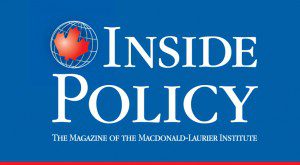By turning from established allies in Asia toward a teetering economy and authoritative regime, Canada is playing a dangerous game with its “China Pivot”, writes MLI Munk Senior Fellow Shuvaloy Majumdar.
By Shuvaloy Majumdar, Oct. 12, 2016
The Trudeau government has been telegraphing its “China Pivot” for quite some time now. Upon arriving in government, Prime Minister Justin Trudeau’s team instructed senior officials to undertake a fundamental rethink on Canada’s relationship with the People’s Republic, deploying ministers to Beijing to talk trade and chum it up with Communist Party brass.
In doing so the Prime Minister seems to be intently wriggling himself further between a rock and a hard place.
The allure of China is clear, with its enormous and growing market of hundreds of millions of consumers. But it’s a growth that is beginning to stagnate. This is the rock.
Over the last decade, Chinese growth has lifted hundreds of millions from poverty, with an extraordinary rise in consumer goods, technology and infrastructure. Yet its economic fundamentals remain weak. China is transitioning from a communist economy of agrarian labourers into the world’s largest exporter. This is no easy change.
Prime Minister Justin Trudeau’s team instructed senior officials to undertake a fundamental rethink on Canada’s relationship with the People’s Republic
Extraordinary skylines are emerging above Chinese cities, but many buildings are unoccupied. The economy’s overcapacity is driven by local-level rivalries instead of market economics, banks pandering to political interests over prudent business decisions, and a financial system that encourages businesses to be big rather than innovate. High debt levels are threatening a major banking crisis, one which would be felt the world over.
 The hard place emerges directly from this slowdown. As economic momentum begins to dissipate, the Chinese government is becoming increasingly assertive and expansionist. The hungry and increasingly irritable dragon will scour the skies and waters of Asia to inspire nationalist sentiment among Chinese. China’s conquest of the South China Sea re-animates a territorial claim that dates back 2,000 years. And not since the Ming Dynasty in the 15th Century has China considered reconstituting its “fortress fleet” beyond its shores, but in recent years China has been flouting international rules in one of the world’s busiest shipping lanes.
The hard place emerges directly from this slowdown. As economic momentum begins to dissipate, the Chinese government is becoming increasingly assertive and expansionist. The hungry and increasingly irritable dragon will scour the skies and waters of Asia to inspire nationalist sentiment among Chinese. China’s conquest of the South China Sea re-animates a territorial claim that dates back 2,000 years. And not since the Ming Dynasty in the 15th Century has China considered reconstituting its “fortress fleet” beyond its shores, but in recent years China has been flouting international rules in one of the world’s busiest shipping lanes.
In advance of hosting the G20 last month, China accelerated a campaign to crack down on religious minorities, including Christians, Falun Gong and Muslims. It imposed information blackouts, jailed dissidents and persecuted activists under the broad rubric of President Xi’s anti-corruption campaign, a campaign focused more on strengthening his hold on the state than establishing the rule of law.
The Chinese government is becoming increasingly assertive and expansionist.
Beyond the mainland, China is actively enforcing its “one China policy” on Taiwan by barring the island’s participation in multilateral fora such as the recent International Civil Aviation Organization meetings in Montreal, and subverting its “one China, two systems” policy by shamelessly contorting Hong Kong’s Basic Law to strengthen Beijing’s hold on the city.
The government’s recently proposed agreements with China on free trade, cyber security, and extradition feature prominently in Trudeau’s China Pivot.
But if the objective is free trade, then much work will need to be done to somehow calibrate Canada’s market-based G7 international capitalist system with China’s declining state-owned, centrally planned, single-party communism.
If the objective is cyber security, then the starting point for any dialogue should be that China end its cyber espionage campaign on the Canadian government, on Canadian companies, and on Chinese-Canadians.
If the objective is an extradition treaty, then China must demonstrate it is a society ordered on the rule of law rather than the persecution of the state’s enemies.
For Canada, engagement with China should hinge on clear interests and values.
By tilting toward Beijing in Asia, Trudeau is making an uncertain, perilous and probably regrettable bet. Harvard researchers last year pointed to how Narendra Modi’s structural reforms in India, while slow, are creating the basis for the “Decade of India” to come, with the Indian economy now outperforming China’s.
The China Pivot risks aligning Canada with China’s ambitions over those of market-based democracies in India and Japan, but also South Korea, Hong Kong, Taiwan and various ASEAN states. By taking its foot off the gas on the Trans-Pacific Partnership to chase after the Chinese market, Canada is not only abandoning friends but also many burgeoning economies. And if the TPP fails, Canada should instead prioritize deals with others around the TPP table, such as Japan, over China.
Canada’s national interests require engagement with China, not submission. The China Pivot turns Canada toward the dubious economic future of an authoritarian irredentist state, hostile to long-time Canadian allies. Should the proposed compacts between Canada and China be ratified, that is a difficult position to back out from.
Shuvaloy Majumdar led democracy assistance initiatives in Iraq and Afghanistan from 2006 to 2010, and recently served as policy director to successive Canadian foreign ministers. He is a Munk Senior Fellow at the Macdonald-Laurier Institute. @shuvmajumdar




